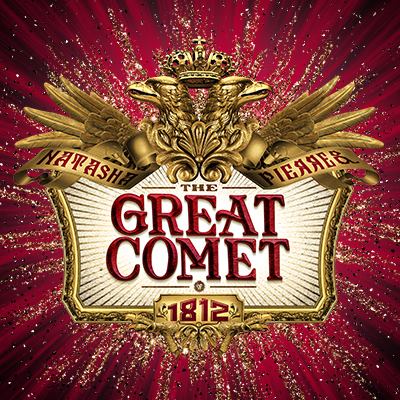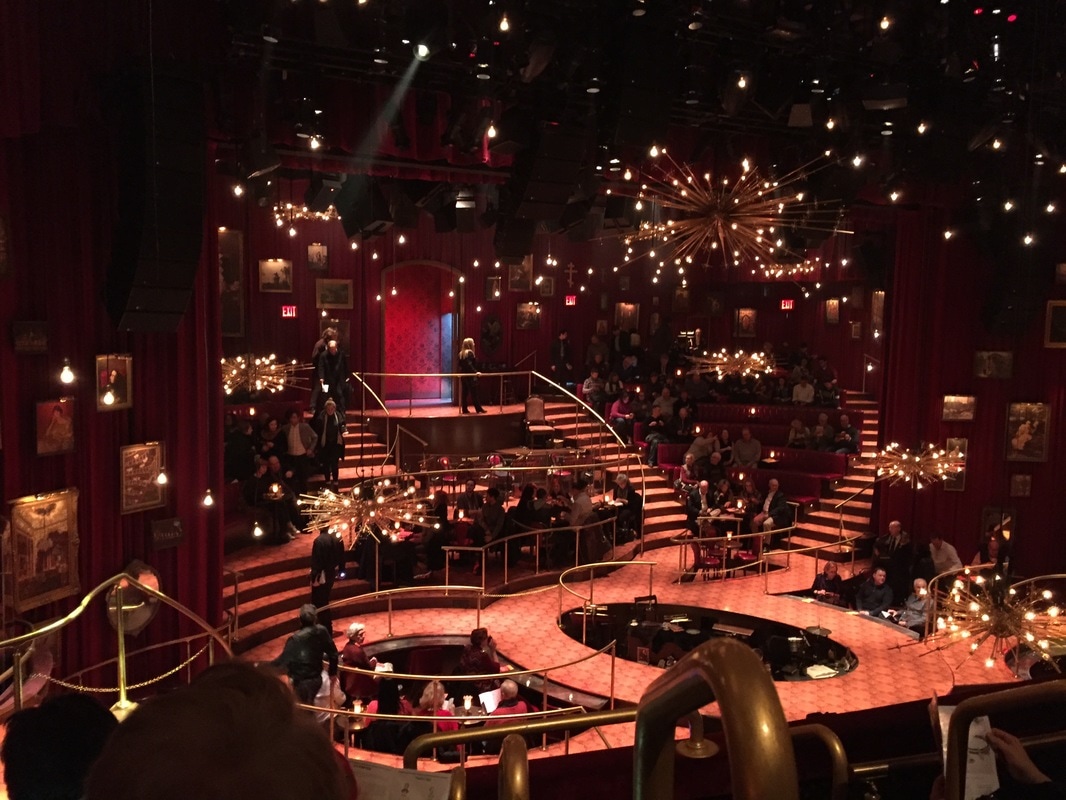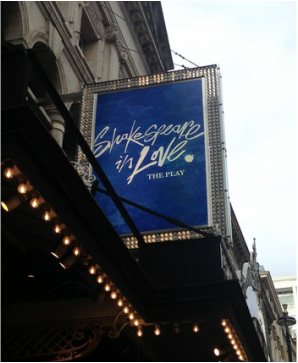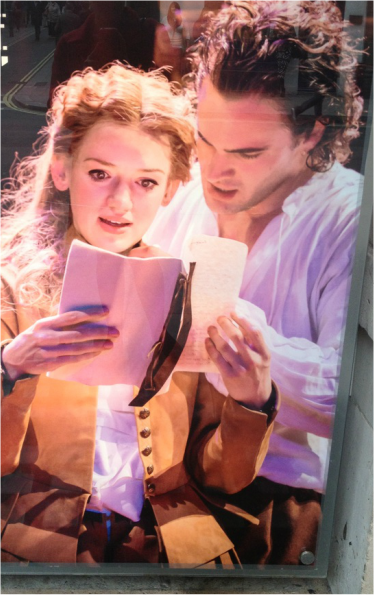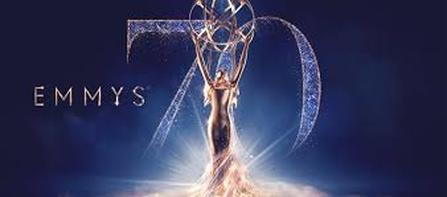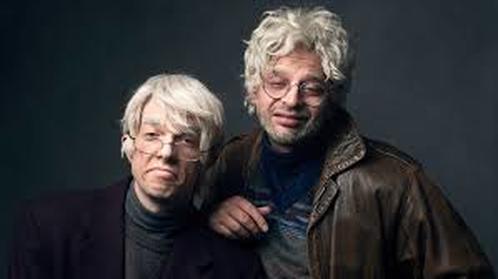 “Oh, Hello”: Oh, Goodbye to the Funniest Show On Br’dwayby Randi / January 23, 2017
“Oh, Hello”: Oh, Goodbye to the Funniest Show On Br’dwayby Randi / January 23, 2017So that’s the spectacle, what about the actual show? The slice of War & Peace it’s based on is literally the least War & Peace-y part, in that it is just like any modern romantic comedy/tragedy storyline you’d find in a modern movie starring someone named Kate. I guess that is a strong case for why they chose it, but it just seemed like a missed opportunity to take something even more out of the box from such a creative premise, instead of taking that creative premise and finding the most humdrum employment of it possible. Natasha, our heroine (played by Denee Benton), is beautiful and young and privileged, and kind of annoying because of it. She arrives on the Moscow scene right before Napoleon’s invasion and subsequent burning of the city. Her fiancé, the handsome Andrey, is off at war and she is like so sad cuz she luvs him. That’s how I imagine she would express her feelings if she typed them; she’s that sort of young and ‘in love’. And flighty. She and her cousin/best friend Sonya are hosted by Marya, Natasha’s godmother, a big deal socialite in Moscow. On the scene (pretty much just the opera, where else did they go back then (also NO ONE actually watched the opera they all just gabbed and socialized how awful)), Natasha meets Anatole, a huge player if there ever was one. He’s blonde and dreamy, so we are told, and he declares he must have her. Natasha falls super in lust with him and, with the push from Anatole’s conniving evil sister Helene, they make a plan to run away together, even though she’s engaged. Luckily, meek lil Sonya finds out the plan to elope and does everything she can to stop it, since it would mean absolute ruin for her cousin and her entire future. Meanwhile, Pierre just kind of watches the world happen around him, as he drinks and jumps into the story every once in a while. And also has a duel with Anatole’s friend Dolokhov but it’s not very significant, at least in this telling. It ranks 4th in importance and drama among duels currently happening on Broadway.
You might be thinking right now, wow that’s a lot of characters and relationships to get a handle on. Don’t worry, the entire opening number is introducing you to the characters and wisely repeating the most important ones the most. I adore this opener. It’s one of the best songs in the score as far as examples of what Malloy was trying to accomplish go. We start by having Pierre, on his accordion, tell us that there’s a war going on and Andrey is there, at war, and so he’s not ‘here’ in Moscow with this crowd. Then we meet each of the characters by having them introduce themselves with their most distinguishable trait. Natasha, whose defining characteristic is that she’s young, goes first. Sonya, her ‘good’ cousin (I’d have gone with meek), goes next, and then we repeat back to Natasha. Then ‘old-school’ Marya, then Sonya repeats her phrase, then Natasha repeats hers. Et cetera, et cetera, so that the main characters repeat theirs the most so you remember more who they are, as opposed to the rickshaw driver who goes last or Andrey’s crazy old father Bolkonsky or plain religious sister Mary who don’t really matter much to the plot. It’s a wonderful opening that does a great job establishing the fun, kind of meta, kind of snarky tone of the show, plus introducing all the characters, with one of the most enjoyable overall songs of the show. It’s rousing and joyous and moves really fast and kind of breathlessly, and you cannot help but grin throughout it. I cannot get out of my head “Anatole is hot, Marya is old-school, Sonya’s good, Natasha’s young and Andrey isn’t heeeere…..Helene is a slut, Anatole is hot, Marya is old-school, Sonya’s good, Natasha’s young and Andrey isn’t heeeere.” There’s also a character diagram in the playbill to help you remember who is related to who and who loves who and blah blah I think it’s unnecessary if you have basic comprehension skills but hey that’s not most people, we know now.
The joy of the opening is consolidated by seamlessly moving into Pierre’s introductory number, which comes after the Prologue ends by asking where the heck he is and what he’s up to. Whereas the Prologue has the rest of the big cast roaming around the theatre causing a ruckus amid the bright house lights, left on, and getting the entire audience pumped, Pierre’s song immediately shifts into an intimate spotlight, just on him playing the piano, just on his tiny spot in the middle of the theatre. It’s as drastic a change you can make from the sensory overload of the opener, and the gloriousness of it all is solidified when Grobester sings his first few lines. It’s a dark, brooding song and he sounded insane on it. Most of the thrill of seeing this show, at least for me and people who have ears, is that we’re seeing Josh Groban perform live. He is as good as you can imagine except better, both in live singing and his acting. And his lil fat suit he’s wearing. The best part of the whole show (maybe true maybe an exaggeration but just a little) is (to paraphrase) when one character says Pierre is staying at home tonight and they show Josh in the pit saying something like “and I’m totally fine with that” and he pumps his fist in the air to weakly prove his point and it’s so hilarious.
Despite the high bar met by the first 15 or so minutes, the score and the book fail to keep up the momentum. It’s hard to write this kind of weird music, objectively ugly at times, and the composer should be commended for doing something so unique. But some of it is not very good, mostly the parts that should have been straight book scenes. A lot of is it literally repeating lines from the novel and singing them repeatedly to an uninspired tune, kind of like the characters are reading their own stage directions. And that’s the main problem with this show: that it doesn’t really work well as a sung-through book (book like the musical narrative structure/libretto, not the novel). There’s no reason for it, when the recitative parts feel dull and the music for them, the plain book parts, doesn’t add anything to the telling of the story. In fact, it takes away from it. And the boring, sometimes bothersome lyrics used in these sung-through book scenes creep into the main songs. At first it’s kind of cute, like aw it’s from the real novel, but it gets annoying and just makes it feel kind of cheapened. This is well on display early when Natasha and Sonya first arrive to Marya’s care, with lyrics like “I will kiss you on the cheek, she said, gazing at Marya with kind, glittering eyes…” and lots of “I blush, happily”. Oof and when Sonya and Natasha fight and Sonya doubles over and sings “Bursting into tears!” and then I did. And in the big Opera scene, when Natasha is introduced to Moscow society, and meets Anatole, and there’s a whole lot of talk about Natasha’s bare arms. It’s weird. It’s using an unnecessary number of words to describe what we can see – like a book does, only a book has to. That’s a huge flaw in the conversion from page to stage. Like, it’s not necessary to have multiple verses describing Natasha’s bare arms and shoulders or Helene as “beautiful, barely clothed, plump bare shoulders, and much exposed neck, round which she wears a double string of pearls” WHEN WE CAN SEE THAT. It’s wasting the storytelling potential on visuals when it has no reason to, except to be a constant, blatant, unneeded reminder that it’s based on a book.
The music, as opposed to the lyrics, has more impressive moments, though the dissonance gets a little hard to enjoy. But the discord is never used to greater effect than when Natasha goes to meet her fiance’s family. Andrey’s father, old Prince Bolkonsky, refuses to even greet her, and his plain sister Mary is a religious nut who initially does not like her at all. Although the lyrics are a little more of the same way-too-direct nature (“And from the first glance, I do not like Natasha. Too fashionably dressed, frivolous and vain” “And he looked at her once, head to toe, and left muttering”), the notes that Natasha and Mary sing create perfect dissonance (an actual musical term though I don’t know if it’s perfect or imperfect for music purposes but it sounded perfect in the great sense) and they lean into it so hard that it’s a fantastic example of music conveying the story in itself. They clash, they don’t get along, and that clash is apparent from the too-close notes they are each singing, creating an aural nails on the chalkboard feeling. It’s so powerful that it makes me even madder that they ruined it by saying first that they didn’t like the other. Like, duh. Let the music do some of your work.
It’s really a shame, thinking about it now, that it’s a sung-through book, which is so hard to do well. Like, for example, “Hamilton” is a sung-through book. That shit works because it’s amazing. The book scenes here are not up to par and it would have been less of a let-down musically if I were only considering the strong main songs as the score, and not all the recitative lamity. (I made up that word. Long A.) As it stands, it’s not my best score of the season, but it might have put up a fight if it didn’t have the sung book scenes dragging it down. Some of the songs are really fantastic. I’m thinking of Pierre’s first song, even though it’s called “Pierre”. I had chills, and it wasn’t just because Grobester is the best. (Even though he is. He is as impressive in his Broadway debut as you could ever hope. He shows so much skill in acting that we never really knew he had, and I cannot wait to see what he does next. He better never leave theatre.) I’m thinking of the incredibly haunting and beautiful “No One Else”, when Natasha remembers when she first fell in love with Andrey and prophetically sings “I’ll never be this happy again” (true). Denee Benton was lovely but I couldn’t help but think of how wonderful Phillipa must have been in this role. (Listen to her sing this song on the original cast recording; it’s beautiful.) I’m thinking of possibly my favorite song (at least to belt in the shower) from the show, “Charming”, when evil, conniving Helene uses flattery to convince the naïve Natasha that it’s totes fine to dance and flirt with Anatole even though she’s engaged. The funniest part about this song is that Helene says the word for ‘charming’ in French – charmante – but says it wrong like ‘shante’ (sometimes you can hear the ‘arm’ but not really). So Dave Malloy apparently just remembered his high school French incorrectly and the rhythm of the song was already set so he kept it as is. It also really works for Helene to be so confident in her ignorance. Amber Gray, as Helene, is probably my favorite female in this cast. She is so seductive and terrible (“sexual and violent”) and she made this like Cruel Intentions if it were a three-minute song. Actually, that’s exactly what her character is like, Sarah Michelle Gellar in that movie, while sounding reminiscent of Daphne Ruben-Vega’s “I-have-vocal-damage-but-I-can-still-hit-all-the-notes” (to paraphrase Seth Rudetksy) rasping yet amazing voice. And I’m thinking of the fantastic group number “Letters”, which (finally) seemed to listen to my requirement for opening the second act of shows on a super strong note. In “Letters”, we’re told how Natasha and Andrey and Anatole and Pierre and really everyone has been discussing their feelings and relationships through written correspondence, which was something people used to do, as we’re told, “in 19th century Russia, we write letters we write letters. We put down in writing what is happening in our minds.” This is a great example of Malloy’s straightforward, 5th-grade-reading-level lyrics really working well when the music and melody and vision of the scene are all strong. I love at the end when the ensemble repeating ‘a love letter, a love letter’ over and over sounds like an army marching towards something ominous. It’s such an awesome song.
A really cool aspect of the show is the out of the box casting. Every cast member seems to have been specifically chosen to be an important part of the show, instead of how it usually feels with cookie cutter dancers, and it gives us actors who don’t seem traditional for Broadway at all. I didn’t recognize any of the ensemble, and I liked how diverse they were in all ways. They seemed like real crazy Russian people at a rave about to start riots. I have to mention Lucas Steele as Anatole, who is so blond and so pale that he seems like a Superman villain but more handsome and with a really strong belt. Most notably out-of-the-box was Brittain Ashford as Sonya, who sings a beautifully aching song called “Sonya Alone”, with her Melissa Etheridge with a lisp while headlining at Lilith Fair with her lesbian life partner holding her hand and making her tea as naked women prance about with flowers in their hair and sway to the sitar music in the warm breeze as the sun sets over the mountains upon which a cow is giving painless birth to a calf blessed with freedom…um, voice. She sounds like an old-timey folk singer, is what I’m saying. I still don’t know if I liked or hated her voice, but I definitely like that she’s different.
The show was paced pretty well (until the end), and despite rolling my eyes a few times at the stage-direction lyrics, it managed to keep up the spectacle-aspect by throwing the ensemble back into the balconies every so often and rousing the audience. There’s also a really weird opera scene, when we see some of the opera the characters are watching, and it’s like the most fever dream dancing behind a blacklight you can imagine. Really weird. Once Natasha and Anatole have their plans thwarted, and Natasha is all ruined and stuff, it started to drag. There’s a lot of Natasha moping around with crazy bug eyes and not much for the chorus to do, so it gets a little slow, especially because the story is kind of lacking. Like, she’s ruined, we get it, but she’s not really. (If you know the novel and the 90% of plot that doesn’t happen onstage, it’s hard to feel too bad for her.) Luckily, the performances are great, so it’s still a wonderful experience. But there’s so much potential for the book and score to live up to the staging and showiness of it all that it’s a tad disappointing that it doesn’t. Still, it’s a solid B overall instead of the A+ I thought it was going to be. If you have no expectations, that’s a really good score. And if you don’t mind tinny clang-clang-clang-went-the-trolley music.
Audience
You’d think for a show that is well sold (read: tickets are super expensive) that people would be better behaved and try to pay attention but nope that doesn’t matter anymore we are in a society where lots of people only think of themselves and the world two inches around them and no one else affected by their behavior matters. (There were some really rude adults who wouldn’t stop talking.)
Stage Door
I MET JOSH GROBAN
EDITOR’S NOTE: ONE YEAR AFTER SEEING THIS SHOW (DEC 30 2017)
HOLY FORKING SHIRTBALLS I HAVE NEVER BEEN SO WRONG ABOUT A SHOW IN MY LIFE. Great Comet is now one of my favorite pieces of theatre OF ALL TIME OF ALL TIME. It’s FORKING GENIUS. Guys, I wrote the above lukewarm review after seeing the show once and NEVER listening to the cast recording, except for the opening number which I said in the review is a great example of what Malloy was trying to accomplish like a fool like a FOOL! He wrote that song kind of as a joke! There’s so much more that blows my mind repeatedly. Listening to the album approximately 10000x has learnt me how incredibly brilliant the score is, both as a whole and in terms of single songs that stand out as should-be classics of sooo many genres. I think that so much of the greatness is uncovered with repeated listens and viewings, and going into the show cold and not knowing what was going on and not having time or space to appreciate the score is what kept audiences from loving it like they should have. I always LOVE going into a show cold – I constantly say that’s the best way to experience it – but I think this is the one time when that was the wrong move. Knowing the score and then having that background knowledge as a foundation to let you enjoy the sensory overload and the amazing choreography and staging would have been a much better plan. But I didn’t know. Now I wish so badly that I could see this show again; I think I would be completely and utterly enraptured with the genius evident on all fronts. Dammit I am shaking my fist so hard at the things I said above! Listen, some of the songs are hard to get into the first time or the first 10 times, like “Moscow”. But freaking push through it, because, for example, “Moscow” is now one of my favorites. Push through and then a barrier breaks and now I am completely hypnotized by the gloriousness. BEST EVER THE END.


